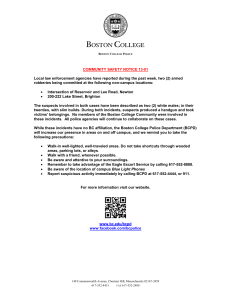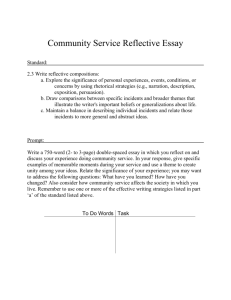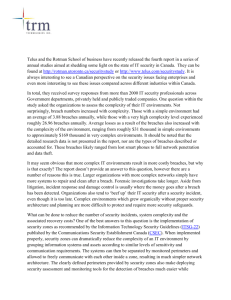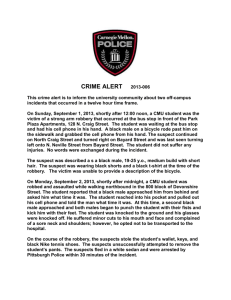SECURITY STAFF SERVICES Manage security incidents, breaches,
advertisement
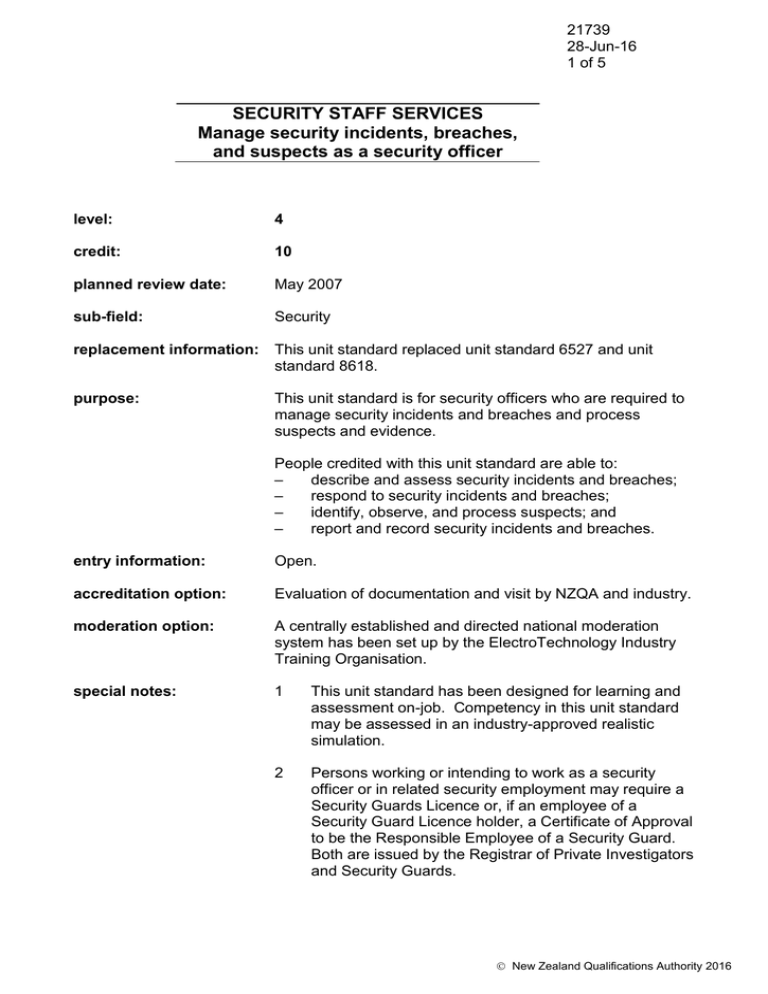
21739 28-Jun-16 1 of 5 SECURITY STAFF SERVICES Manage security incidents, breaches, and suspects as a security officer level: 4 credit: 10 planned review date: May 2007 sub-field: Security replacement information: This unit standard replaced unit standard 6527 and unit standard 8618. purpose: This unit standard is for security officers who are required to manage security incidents and breaches and process suspects and evidence. People credited with this unit standard are able to: – describe and assess security incidents and breaches; – respond to security incidents and breaches; – identify, observe, and process suspects; and – report and record security incidents and breaches. entry information: Open. accreditation option: Evaluation of documentation and visit by NZQA and industry. moderation option: A centrally established and directed national moderation system has been set up by the ElectroTechnology Industry Training Organisation. special notes: 1 This unit standard has been designed for learning and assessment on-job. Competency in this unit standard may be assessed in an industry-approved realistic simulation. 2 Persons working or intending to work as a security officer or in related security employment may require a Security Guards Licence or, if an employee of a Security Guard Licence holder, a Certificate of Approval to be the Responsible Employee of a Security Guard. Both are issued by the Registrar of Private Investigators and Security Guards. New Zealand Qualifications Authority 2016 21739 28-Jun-16 2 of 5 SECURITY STAFF SERVICES Manage security incidents, breaches, and suspects as a security officer 3 References Crimes Act 1961; Evidence Act 1908; Health and Safety in Employment Act 1992, and associated regulations; New Zealand Bill of Rights Act 1990; Privacy Act 1993; Private Investigators and Security Guards Act 1974; Summary Offences Act 1981; Trespass Act 1980; other related Acts and regulations and their subsequent amendments. 4 Definitions Best practice – an approved current method or way of doing something that, in the circumstances, achieves the required outcome. Instructions – may be assignment instructions, organisation instructions, equipment operating instructions, site instructions. Modus operandi – a criminal investigation term for way of operating. Security breach – any action, omission, or condition that diminishes or adversely affects security. Security incidents – events or occurrences of significance to security that require identification, response, treatment, or management by a security officer, especially those specified in relevant instructions. 5 All assessment activities undertaken for this unit standard must be within the law. 6 All evidence must be in accordance with relevant instructions and best practice, and must be within the law. 7 The health and safety of the candidate, assessor and others must be maintained when assessment is being undertaken against this unit standard. New Zealand Qualifications Authority 2016 21739 28-Jun-16 3 of 5 SECURITY STAFF SERVICES Manage security incidents, breaches, and suspects as a security officer Elements and Performance Criteria element 1 Describe and assess security incidents and breaches. Range: evidence is required for at least three types of incidents and three breaches. performance criteria 1.1 Incidents and breaches are described with reference to indicators, causes, types, effects, and the security officer’s responsibility. 1.2 The response to each incident and breach is described. element 2 Respond to security incidents and breaches. performance criteria 2.1 Incidents and breaches are reported. 2.2 Advice, information, and assistance are sought as required. 2.3 Immediate action is taken to minimise and/or contain damage and to ensure personal safety. 2.4 Follow up procedures are implemented as required. 2.5 Evidence, witnesses, crime scenes, and other indications of each incident or breach are protected from interference to preserve their integrity and prevent compromise. New Zealand Qualifications Authority 2016 21739 28-Jun-16 4 of 5 SECURITY STAFF SERVICES Manage security incidents, breaches, and suspects as a security officer element 3 Identify, observe, and process suspects. performance criteria 3.1 Suspects are identified. Range: characteristics, modus operandi. 3.2 Continuous surveillance of suspects is maintained until it is evident that an offence has, or is likely to be committed, or a prohibited activity has, or is likely to occur, or that no offence will be committed, or no prohibited activity will occur. 3.3 Immediate reports and requests for support, advice, or assistance are appropriate for the circumstances. 3.4 Treatment of suspects is appropriate for the circumstances. Range: 3.5 treatment may include – take no action, call for assistance, defuse, withdrawal, calm, isolate suspects. Searches are conducted in accordance with the law. Range: suspects, property. 3.6 Evidence is identified, processed, and documented. 3.7 Suspects are treated humanely, observed at all times to prevent self-injury and injury to others, and the destruction of evidence. element 4 Report and record security incidents and breaches. performance criteria 4.1 Reports and records are completed in approved format and processed in accordance with evidential requirements. 4.2 Information is complete, concise, logically organised, factual, unambiguous, and clear to the target audience. New Zealand Qualifications Authority 2016 21739 28-Jun-16 5 of 5 SECURITY STAFF SERVICES Manage security incidents, breaches, and suspects as a security officer Comments on this unit standard Please contact the ElectroTechnology Industry Training Organisation reviewcomments@etito.co.nz if you wish to suggest changes to the content of this unit standard. Please Note Providers must be accredited by the Qualifications Authority or a delegated interinstitutional body before they can register credits from assessment against unit standards or deliver courses of study leading to that assessment. Industry Training Organisations must be accredited by the Qualifications Authority before they can register credits from assessment against unit standards. Accredited providers and Industry Training Organisations assessing against unit standards must engage with the moderation system that applies to those standards. Accreditation requirements and an outline of the moderation system that applies to this standard are outlined in the Accreditation and Moderation Action Plan (AMAP). The AMAP also includes useful information about special requirements for providers wishing to develop education and training programmes, such as minimum qualifications for tutors and assessors, and special resource requirements. This unit standard is covered by AMAP 0003 which can be accessed at http://www.nzqa.govt.nz/site/framework/search.html. New Zealand Qualifications Authority 2016
